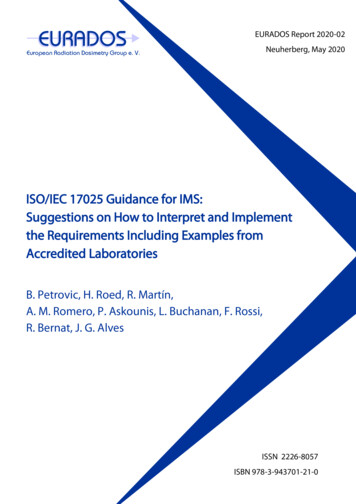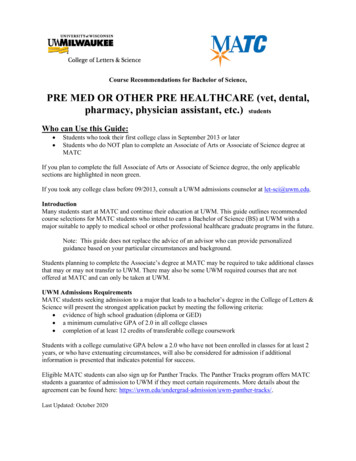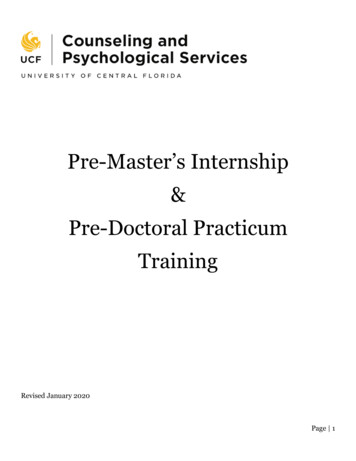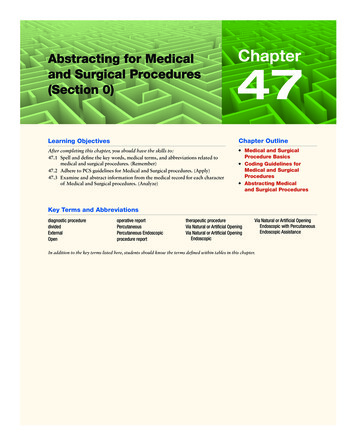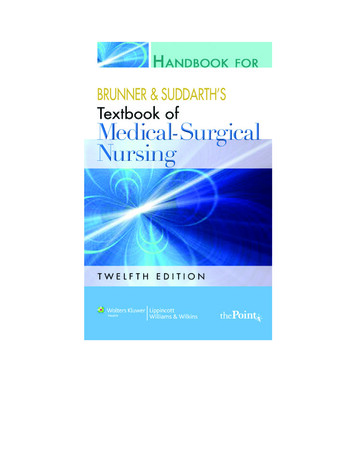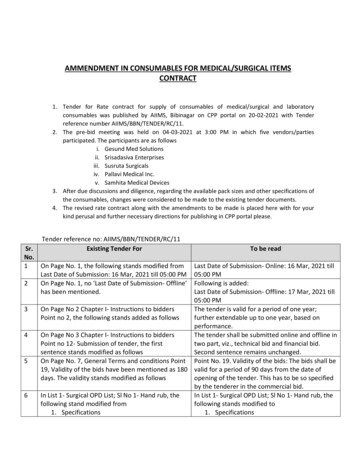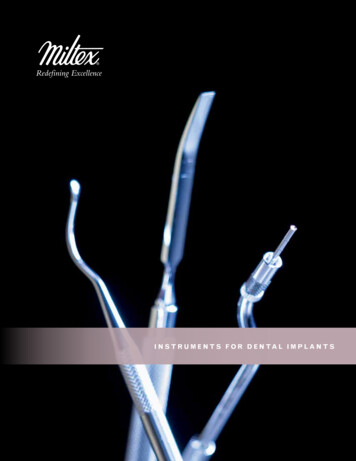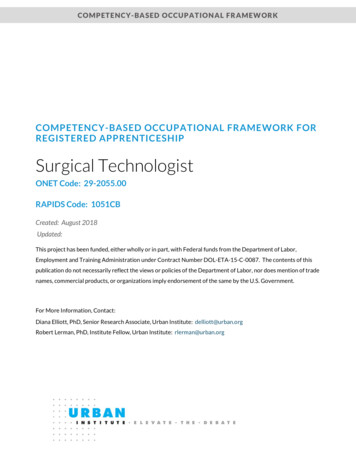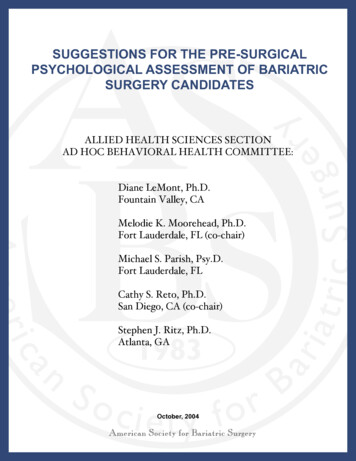
Transcription
SUGGESTIONS FOR THE PRE-SURGICALPSYCHOLOGICAL ASSESSMENT OF BARIATRICSURGERY CANDIDATESALLIED HEALTH SCIENCES SECTIONAD HOC BEHAVIORAL HEALTH COMMITTEE:Diane LeMont, Ph.D.Fountain Valley, CAMelodie K. Moorehead, Ph.D.Fort Lauderdale, FL (co-chair)Michael S. Parish, Psy.D.Fort Lauderdale, FLCathy S. Reto, Ph.D.San Diego, CA (co-chair)Stephen J. Ritz, Ph.D.Atlanta, GAOctober, 2004American Society for Bariatric Surgery
iiTable of ContentsIntroduction.1Objectives of the Assessment .1Assessment Content .1Behavioral.2Previous Attempts at Weight ManagementEating and Dietary StylesPhysical Activity and InactivitySubstance UseHealth Related Risk-Taking BehaviorLegal HistoryCognitive and Emotional .6Cognitive FunctioningKnowledge of Obesity and Surgical InterventionsCoping Skills, Emotional Modulation, BoundariesPsychopathologyDevelopmental History .8Current Life Situation .9StressorsUtilization of Social SupportMotivation and Expectations .10Summary .10Psychological Testing.11Clinical Rationale .11Test Selection Criteria .12Test Options .14Written Report.15Qualifications of the Behavioral Health Examiner.15Conclusion .16AppendicesAppendix A: Assessment Tools and Measures .17Appendix B: Suggested Readings.28
ASMBS DisclaimerThis document was originally published in 2004 and has never been updated. It is currentlybeing substantially revised. At least some of the information contained in this document is likelyout of date. Moreover, some suggestions contained in the document may no longer representcurrent medical consensus or opinion. This document will continue to be posted for historicalpurposes. Users are urged to conduct their own current research and to verify vendor and otherinformation contained in this document prior to citation or other reliance on the document. ASMBS July 2011
Suggestions for the Pre-Surgical Assessment ofBariatric Surgery CandidatesIntroductionThis document is intended to provide an overview of elements that are important to the presurgical assessment. Given the paucity of empirical data in this area, this paper is not intended toserve as training or as a statement of standardization, consensus, or best practice guidelines forconducting this assessment. Instead, our aim is to address the content of a preoperativepsychological assessment, the role of psychological testing, and the qualifications of thepractitioner who completes these assessments.Objectives of the AssessmentWhen a surgeon assesses patients for bariatric surgery, he/she ascertains their general health,with the idea of identifying those for whom surgery is too risky and those who have conditionsthat need to be treated, stabilized, or managed for surgery to be worth its risk. Behavioral healthspecialists can no more “predict” a particular psychological outcome than the physician can“predict” a surgical or medical complication. We can, however, via the pre-operative behavioralhealth assessment, identify psychosocial risk factors and make recommendations to both theclient and surgical group that are aimed at facilitating the best possible outcome for the patient.Patients are typically faced with initial dietary restrictions, permanent changes in eating anddietary habits, altered body sensations and experiences, shifting body image and self carebehaviors, new cognitions and feelings, and an emerging and different lifestyle. In addition, theymay realize sometimes unexpected and significant changes in relationships that may result inmarked stress. Bariatric surgery is a highly effective procedure that not only reconfigures and/orrestricts a patient’s stomach, but significantly affects their psyche as well. Generally patientswill need a secure identity, sound psychological resources, resiliency, effective coping strategies,and willingness to access meaningful support from others.When problematic pre-surgery psychosocial factors are identified, the clinician is able to alert thetreatment team and the patient, and make appropriate recommendations. Recommendations mayinclude pharmacological interventions, psycho-education, psychotherapy to address potentialpost surgery stumbling blocks, nutritional consultation, close aftercare monitoring, and/orbariatric surgery support group attendance.Assessment ContentCommon categories of assessment include: behavioral, cognitive/emotional, developmental,current life situation, motivation, and expectations.
Suggestions for Pre-Surgical Assessments2Behavioral Previous Attempts at Weight ManagementIt is well documented that non-surgical attempts at weight management for patients withmorbid obesity have little if any long-term efficacy. Nonetheless, a thorough weight and diethistory can provide valuable information regarding the psychological, behavioral, andphysiological contributors to the progression of morbid obesity. Patterns of loss and regainprovide information regarding eating habits and lifestyle as well as behavioral and emotionalfactors that have contributed to past successes or failures—and may be relevant post surgery. Eating and Dietary StylesThe assessment of dietary habits and eating styles provide the clinician with vital informationthat not only points to the client’s readiness for surgery but may indicate issues that willeither support or interfere with issues of post surgical compliance and adherence. Trackingeating behaviors over time and across situations (e.g., stressful situations or holidays) canoffer valuable insights and information regarding these issues. If the candidate demonstratesdifficulties in one or more of these areas, we make an effort to identify these areas ofvulnerability, help the client predict and prepare for these situations, and propose appropriateinterventions.Assessing how a particular mindset influences eating can also provide important information.For example, it may be useful to track changes in eating and drinking habits prior to the timethe client made the decision to pursue a bariatric surgical procedure, those habits at the timeof making the decision to become a surgery candidate, and after attending the information(or orientation) seminar for surgery. Documenting the candidate’s efforts over time to modifyeating behavior and fluid intake and to cultivate a healthy lifestyle can serve to capture thedegree to which the candidate understands the basic principles of healthy eating, revealwhether the candidate is motivated to modify behavior, and suggest the extent to whichunhealthy eating (and other unhealthy lifestyle habits) is ingrained.Accurately distinguishing between different types of maladaptive eating behaviors servesmany purposes. Primarily it helps delineate maladaptive patterns of eating that aresubsequent to dieting and restriction versus those styles of eating that are clearly emotionallydriven. Binge eating: Studies suggest that approximately 30% of individuals presenting forthe treatment of obesity engage in binge eating.1 It is important to distinguishbetween binge eating that is driven by psychological factors and binge eating that isdriven by physiological factors.2 Keys, et al.3 uniquely demonstrated that the direct1Spitzer, R. L., Yanovski, S., Wadden, T.A., Wing, R., Marcus, M.D., Stunkard, A.J., Devlin, M., Mitchell, J.,Hasin, D., & Horne,R.L. (1993). Binge-eating disorder: It’s further validation in a multisite study. InternationalJournal of Eating Disorders, 13, 137-150.2Grilo, C.M., Masheb, R.M. & Wilson, G.T. (2001). Subtyping binge eating disorder. Journal of Consulting andClinical Psychology, 69, 1066-1072.
Suggestions for Pre-Surgical Assessments3biological consequences of semi starvation and restricted eating includepreoccupation with food, increased pressures to eat, and the likelihood of bingeeating. Other types of physiologically driven binge eating may be triggered if eatingis initiated in an intense state of hunger (reactive overeating) or if restrained eating isdisrupted via disinhibition or counterregulation. Overeating: Overeating may represent a lack of interoceptive awareness and aninability to discern internal cues such as hunger, appetite, satiety, or fullness.Alternatively, overeating may represent a conscious decision to eat “just because” oreating that is more emotionally driven. Many times early incidences of binge eatingconvert to discrete periods of overeating that are no longer hallmarked by theindicators of control associated with binge eating. Grazing: Grazing may stem from habit and mindlessness or may be compulsive oremotional in nature. Night eating syndrome is defined as skipping breakfast 4 days per week,consuming more than 50% of calories after 7 PM, and difficulty falling asleep orstaying asleep 4 days per week.4 The prevalence of night eating syndrome in presurgical bariatric candidates has been reported to be as high as 26%5 and as high as27% in a bariatric sample 32 months after surgery.6 Physical Activity and InactivityPhysical activity and fitness are related to improved health and quality of life,7 while physicalinactivity is related to increased risk for cardiovascular disease8 and has been implicated inthe development of obesity. Some candidates report having a moderate activity program inplace that is appropriate to their body size, shape, and physical limitations. Others maydescribe an almost entirely sedentary lifestyle. All candidates should understand therelationship between physical activity and lifelong management of morbid obesity andoptimal states of physical and psychological health. Some patients seem more amenable toincorporating body movement into their daily lives when: (a) it is fun, and/or (b) it is done3Keys, A., Brozek, J., Jenschel, A., Mickelson, O., Taylor, H.l. (1950). The Biology of Human Starvation.Minneapolis, Minn: University of Minnesota Press.4Stunkard, A., Berkowitz, R., Wadden, T., et al. (1996). Binge eating disorder and the night eating syndrome.International Journal of Obesity and Related Metabolic Disorders, 20, 1-6.5Rand, C.S.W., & Kuldau, J.M. (1993). Morbid obesity: A comparison between a general population and obesitysurgery patients. International Journal of Obesity, 17, 657-661.6Rand, C.S.W., MacGregor, A.M.C., & Stunkard, A.J. (1997). The night eating syndrome in the general populationand among postoperative obesity surgery patients. International Journal of Eating Disorders, 5, 75-84.7Paffenbarger, Jr., R.S., Hyde, R.T., Wing, A.L., & Hsieh,C. (1986). Physical activity, all-cause mortality, andlongevity of college alumni. New England Journal of Medicine, 314: 605-613.8Fletcher, G.F., Blair, S.N., Blumenthal, J., et al. (1992). Benefits and recommendations for physical activityprograms for all Americans: A statement for health professionals by the Committee on Exercise and CardiacRehabilitation of the Council on Clinical Cardiology, American Heart Association. Circulation, 86: 340-344.
Suggestions for Pre-Surgical Assessments4for the purpose of disease management (to improve cardiovascular fitness), (c) it is used as astress releaser, (d) it improves sleep, or (e) it becomes a social outlet, and not engaged insimply for “weight loss” or as an antidote to eating. By operating from this mindset, patientsmay be more likely to sustain their activity program.Whether or not a candidate is currently engaging in appropriate activity, it is important toassess his/her plan (if any) to incorporate meaningful exercise post surgery. How reasonableis their plan? What will be necessary for them to maintain physical activity after surgery?Work schedules and family commitments may make it difficult to initiate a consistent plan.Some communities are more exercise-friendly than others and it is important to ascertainwhat barriers to sustained post surgery exercise the patient’s home environment andneighborhood community may pose. Substance UseWhile the assessment of substance use is standard practice for all healthcare practitioners, theevaluator may also wish to explore potential links between the person’s use of a substanceand his/her: (a) judgment and self-management behavior, (b) coping style,(c) addiction proneness, (d) compulsive tendencies, and (e) need to self-medicate (e.g., in aneffort to manage depression, anxiety, insomnia, and/or
Psychological Testing . Written Report.15 Qualifications of the Behavioral Health Examiner .15 Conclusion . 27% in a bariatric sample 32 months after surgery.6 Physical Activity and Inactivity Physical activity and fitness are related to improved health and quality of life,7 while physical inactivity is related to increased risk for cardiovascular disease8 and has been implicated .
